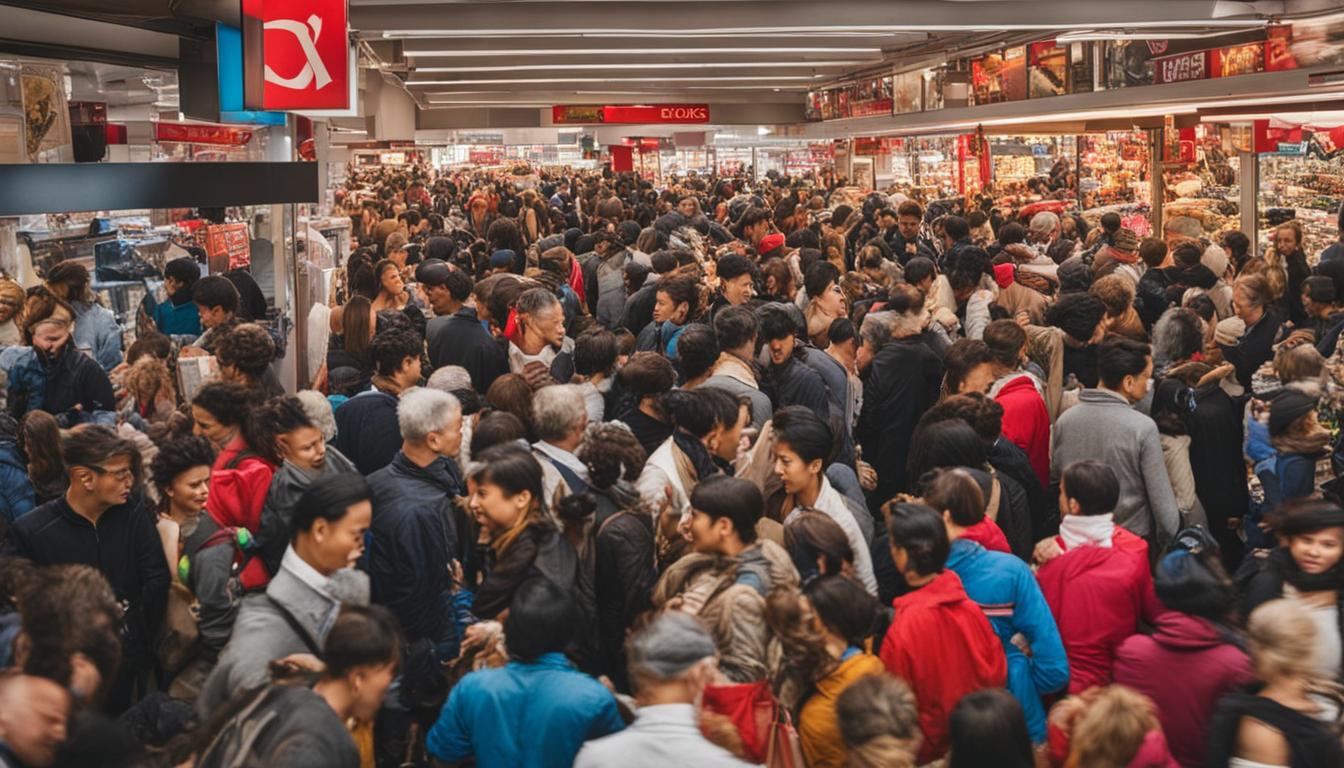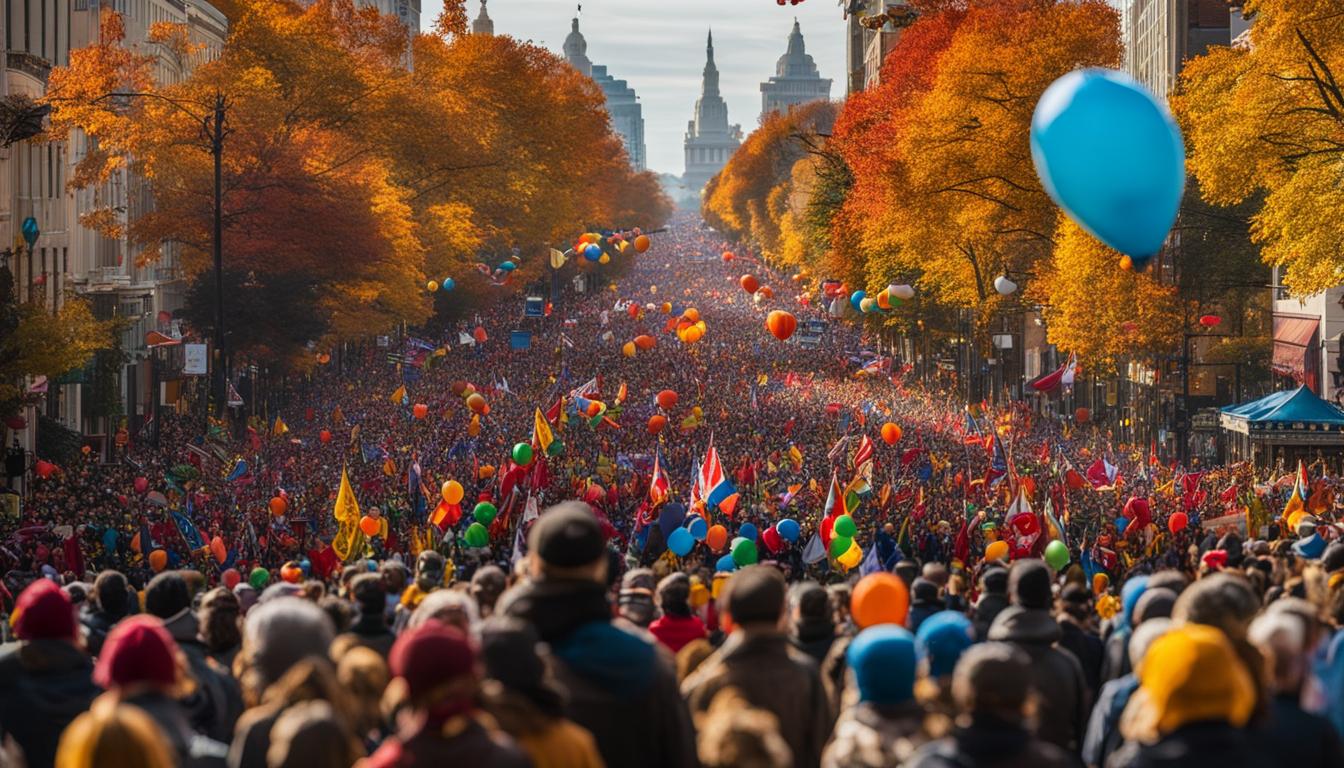The Day After Thanksgiving, also known as Black Friday, is a highly anticipated day in the United States. While it is not a federal holiday, it is celebrated as a state holiday in 22 states. This day marks the official start of the Christmas shopping season and is known for its incredible shopping deals and discounts.
Although not everyone gets the day off, many employers do offer it as a paid holiday, making it a popular day for shopping and spending time with family and friends. Whether you’re looking for the best deals or planning to relax and enjoy the long weekend, here’s what you need to know about the Day After Thanksgiving federal holiday.
Key Takeaways:
- The Day After Thanksgiving is celebrated on the Friday after the fourth Thursday in November.
- It is a state holiday in 22 states, with many employers providing paid time off.
- Black Friday is known for its shopping deals and discounts, marking the start of the Christmas shopping period.
- Offering employees holiday time off improves morale and fosters a positive company culture.
- Consider your workplace needs and employee preferences when choosing a holiday policy.
History of the Day After Thanksgiving
The Day After Thanksgiving, more commonly known as Black Friday, has a fascinating history. The term “Black Friday” was first used in the 1950s to describe the day when workers called out sick to have a four-day weekend. It gained traction in Philadelphia, where the streets became congested with shoppers taking advantage of the long weekend to start their Christmas shopping.
The term “Black Friday” is believed to refer to the day’s profitability, as it brought merchants “in the black” or profitable. Today, Black Friday is synonymous with shopping deals and sales, with retailers offering discounts and special promotions to attract customers.
“Black Friday has become a cultural phenomenon, with millions of people eagerly anticipating the deals and discounts available on this day. It marks the unofficial start of the holiday shopping season and has evolved into a tradition of its own.”
Whether you love or hate the chaos of Black Friday, there’s no denying its impact on the retail industry and the excitement it generates among shoppers.
The Evolution of Black Friday
Over the years, Black Friday has evolved from a single day of shopping deals to a weekend-long event, with many retailers extending their sales and promotions beyond Friday. In recent years, online shopping has also become an integral part of Black Friday, with e-commerce platforms offering exclusive deals and discounts.
While Black Friday has faced criticism for promoting consumerism and excessive spending, it continues to attract millions of shoppers who eagerly await the opportunity to score great deals and kick-start their holiday shopping.
The Popularity of the Day After Thanksgiving
The Day After Thanksgiving, also known as Black Friday, has gained immense popularity in the United States. This day is highly anticipated by many people as it offers numerous shopping deals and discounts, making it the perfect time to kickstart the holiday shopping season.
According to the Bureau of Labor Statistics, 39% of private-sector workers and 69% of public-sector workers get a paid holiday on the Day After Thanksgiving. This makes it a more popular holiday than Federal holidays such as Presidents’ Day and Veteran’s Day. Additionally, the addition of this holiday creates a four-day weekend, providing individuals with more time to relax, spend time with family, and take advantage of the exciting shopping deals.
Retailers go all out to attract shoppers on this day, offering doorbuster deals, early bird discounts, and exclusive promotions. Many stores open their doors early in the morning, with some even starting at midnight. Online shopping has also become increasingly popular on the Day After Thanksgiving, allowing people to conveniently shop from the comfort of their homes.
In summary, the Day After Thanksgiving has gained widespread popularity due to its reputation for offering incredible shopping deals and creating a long weekend for individuals to enjoy. Whether you prefer to shop in stores or online, this day provides an excellent opportunity to snag great bargains and get a head start on your holiday shopping.

Black Friday Traditions
Black Friday has become synonymous with shopping deals, retail sales, and a unique set of traditions. This day after Thanksgiving has evolved into an event that millions of Americans look forward to every year. Here are some of the key traditions associated with Black Friday:
- Early Morning Store Openings: Many retailers open their doors as early as midnight or in the early hours of the morning to kick off the Black Friday sales. This has become a tradition for avid shoppers who line up outside stores in hopes of scoring the best deals.
- Long Lines and Competitive Shopping: Black Friday is notorious for its long lines of enthusiastic shoppers. People strategize and plan their shopping trips in advance, aiming to get their hands on highly sought-after items before they sell out. The thrill of finding a great deal and the competitive atmosphere make the experience memorable.
- Special Doorbuster Deals: Retailers entice shoppers by offering exclusive doorbuster deals and limited-time offers on popular products. These deals are often available in limited quantities and for a limited time, creating a sense of urgency among shoppers.
- Online Shopping: With the rise of e-commerce, online shopping has also become a significant part of Black Friday. Many retailers offer online-exclusive deals and discounts, allowing shoppers to browse and purchase items from the comfort of their homes. This has made Black Friday accessible to a wider audience and has added convenience to the shopping experience.
Black Friday traditions vary from person to person, but they all revolve around the excitement of finding great bargains and kickstarting the holiday shopping season. Whether it’s waking up early to hit the stores, participating in online shopping sprees, or simply enjoying the hustle and bustle of the day, Black Friday has become a cultural phenomenon that extends beyond just shopping.
| Year | Total Retail Sales (in billions) |
|---|---|
| 2017 | $5.03 |
| 2018 | $6.22 |
| 2019 | $7.40 |
| 2020 | $9.00 |
Cyber Monday: The Biggest Online Shopping Day
Cyber Monday, the Monday after Thanksgiving, has become one of the most anticipated shopping days of the year. It offers consumers the opportunity to take advantage of exclusive online deals and discounts, all from the comfort of their own homes. With the rise of e-commerce, Cyber Monday has grown in popularity, rivaling the traditional brick-and-mortar shopping experience of Black Friday.
Online shopping has become increasingly convenient and accessible, making Cyber Monday an attractive option for many shoppers. Retailers offer a wide range of promotions, from limited-time flash sales to free shipping, to entice customers to make purchases. The convenience of shopping online allows consumers to easily compare prices, read reviews, and find the best deals without the hassle of crowded stores and long lines.
Cyber Monday has revolutionized the way people approach holiday shopping. It offers a stress-free alternative to the chaotic shopping experience of Black Friday. Whether it’s scoring great deals on electronics, snagging the latest fashion trends, or checking off items on a holiday gift list, Cyber Monday has become a shopping event that consumers eagerly look forward to each year.

The Rise of Online Shopping
The popularity of Cyber Monday can be attributed to the increasing prevalence of online shopping. With the advancement of technology and the widespread use of smartphones, consumers can easily browse and purchase products at any time and from anywhere. Online retailers have capitalized on this trend by offering Cyber Monday-exclusive discounts and promotions, making it a highly anticipated event for bargain hunters.
The convenience and accessibility of online shopping have also contributed to the growth of Cyber Monday. With just a few clicks, shoppers can find and compare products, read customer reviews, and make secure transactions. Online retailers have optimized their websites and mobile apps to provide a seamless and user-friendly shopping experience, further driving the popularity of Cyber Monday.
As the digital landscape continues to evolve, Cyber Monday is expected to remain a significant shopping event. With the convenience, accessibility, and exclusive deals offered by online retailers, consumers can expect to find incredible savings and a wide array of products during this virtual shopping extravaganza.
Thanksgiving Weekend Policies in the Workplace
While the Day After Thanksgiving is not a federal holiday, it is a paid holiday for many employees. According to the Bureau of Labor Statistics, 97% of civilian and private industry workers have paid time off for Thanksgiving. Additionally, 99% of state and local government workers have paid time off for the holiday. Service occupations are the least likely to have the day off, while government service workers are more likely to have the day off compared to other workers.
Offering employees holiday time off has several benefits. It can improve employee morale, increase productivity, and foster a positive company culture. Paid holidays show that a company values work-life balance and respects employees’ needs. Studies have also shown that time away from work leads to better overall health and happiness, which ultimately translates to greater success at work. Additionally, a generous paid-holiday policy can help attract strong candidates and reduce employee turnover.
When choosing a holiday policy for your workplace, it is important to consider your company’s needs and the preferences of your employees. Companies with remote or hybrid staff may need to adapt their policies to accommodate different working arrangements. Additionally, taking into account the diversity of your workforce and their cultural traditions can help create an inclusive holiday policy. Floating holidays can be a great option to accommodate a variety of holiday traditions and preferences.
“Offering employees holiday time off has several benefits. It can improve employee morale, increase productivity, and foster a positive company culture.”
Benefits of Giving Employees Holiday Time Off
Offering employees holiday time off has several benefits. It can improve employee morale, increase productivity, and foster a positive company culture. Paid holidays show that a company values work-life balance and respects employees’ needs. Studies have also shown that time away from work leads to better overall health and happiness, which ultimately translates to greater success at work. Additionally, a generous paid-holiday policy can help attract strong candidates and reduce employee turnover.
When employees have the opportunity to take time off and recharge, it revitalizes their energy and motivation. It allows them to spend quality time with their families, pursue hobbies, and engage in activities that bring them joy. This rejuvenation translates into increased productivity when they return to work, as they are more focused, motivated, and creative. Employees who feel valued and have a good work-life balance are more likely to go the extra mile for their employers and are less likely to experience burnout, leading to higher job satisfaction and retention rates.
A generous paid-holiday policy also helps to create a positive company culture. It demonstrates that the company values its employees’ well-being and recognizes the importance of rest and rejuvenation. This commitment to work-life balance fosters a sense of loyalty and dedication among employees and strengthens their emotional connection to the company. Employees who feel appreciated and supported are more likely to be engaged in their work, collaborate effectively with their colleagues, and contribute to a positive and productive work environment.

In summary, giving employees holiday time off has numerous benefits for both employees and employers. It improves morale, increases productivity, and contributes to a positive company culture. Employees who feel valued and have the opportunity to rest and recharge are more likely to be motivated, productive, and satisfied in their work. A generous paid-holiday policy is an investment in employee well-being and can help attract and retain top talent.
The Thanksgiving Weekend in Different States
The Day After Thanksgiving is a state holiday in 22 states, including California, Florida, Illinois, Texas, and Washington. However, there are regional variations in how this day is observed. For example, in Georgia, the day after Thanksgiving commemorates the birth of Robert E. Lee and is a state holiday. Northeastern states have a lower percentage of companies providing a paid holiday compared to other regions. Overall, the percentage of companies providing a longer Thanksgiving holiday has remained significant across the surveyed years.
| State | Observance |
|---|---|
| California | State Holiday |
| Florida | State Holiday |
| Illinois | State Holiday |
| Texas | State Holiday |
| Washington | State Holiday |
While the Day After Thanksgiving is observed as a state holiday in many states, there are variations in how it is celebrated and recognized. In some states, it is a day off for all employees, while in others, it may be limited to certain industries or government workers. Regional differences in the observance of the Day After Thanksgiving highlight the diversity of holiday traditions and cultural practices across the United States.
These regional variations also extend to the availability of shopping deals and discounts on the Day After Thanksgiving. While it is a popular day for retail sales nationwide, the level of participation and promotion may vary by region and state. Some areas may have more extensive sales and promotions, while others may have a more subdued retail environment. Local customs and consumer preferences can influence the shopping experience and the overall impact of the Day After Thanksgiving in different states.
Regional Variations in Observance
In addition to state holidays, there are regional variations in how the Day After Thanksgiving is observed. These variations can include differences in the types of events or activities that take place, as well as the level of public participation. For example, in states where the day is not a state holiday, there may still be community events and special promotions organized by local businesses. These events can contribute to the overall atmosphere and sense of celebration surrounding the Day After Thanksgiving in different states.
Future Dates of the Day After Thanksgiving
The Day After Thanksgiving, also known as Black Friday, is observed on different dates each year. Its future dates depend on the fourth Thursday in November. While it is a state holiday in many states, it may not be a public holiday in all areas. Here are the future dates of the Day After Thanksgiving in selected states:
| Year | Date | States with State Holiday |
|---|---|---|
| 2023 | November 24 | 20 states |
| 2024 | November 29 | 20 states |
It is important to note that the specific observance of the Day After Thanksgiving may vary by state. While it is a paid holiday in many states, the exact policies and observances may differ. The Day After Thanksgiving is an opportunity for relaxation, family time, and taking advantage of the retail sales and deals.

The Thanksgiving Weekend Traditions
The Thanksgiving weekend is a time of family celebration and bargain shopping. Thanksgiving is widely celebrated on the fourth Thursday in November, with schools and universities closed for the entire weekend. Many people spend the day after Thanksgiving, also known as Black Friday, shopping for deals and discounts. It has become a tradition for many families to go out together and take advantage of the sales. In Georgia, this day also commemorates the birth of Robert E. Lee.
During the Thanksgiving weekend, families come together to enjoy quality time and create lasting memories. They gather around a delicious feast, sharing stories, laughter, and gratitude. It is a time to express appreciation for the blessings in life and strengthen the bond between loved ones.
After the heartfelt Thanksgiving celebration, the focus shifts to the excitement of Black Friday. Families wake up early and head out to shopping centers, armed with their lists and eager to score the best deals. It has become a tradition to navigate through crowded stores, searching for the perfect gifts and taking advantage of the steep discounts offered during this time.
The Thanksgiving weekend also provides an opportunity for families to kick-start their holiday decorations and preparations. Many families use this time to put up their Christmas trees, hang lights, and transform their homes into festive wonderlands. It’s a time of anticipation and joy as the holiday season officially begins.
Family Celebration and Bargain Shopping:
| Family Celebration | Bargain Shopping |
|---|---|
| – Thanksgiving feast | – Early morning store openings |
| – Quality time with loved ones | – Long lines of eager shoppers |
| – Sharing stories and laughter | – Competitive retail sales |
| – Expressing gratitude | – Special doorbuster deals |
| – Starting holiday decorations | – Online-exclusive deals |
“The Thanksgiving weekend is a cherished time for families to come together, celebrate, and create lasting memories. It is a time of gratitude, warmth, and joy. It is also a time for bargain shopping, where families embark on the annual tradition of seeking out the best deals and discounts. The combination of family celebration and bargain shopping makes the Thanksgiving weekend a truly special and exciting time.”
Overall, the Thanksgiving weekend combines the warmth of family gatherings with the thrill of bargain hunting. It is a time when families can enjoy each other’s company, express gratitude, and kick-start the holiday season with enthusiasm. Whether it’s sharing a delicious meal or scoring great deals, the Thanksgiving weekend traditions bring joy and togetherness to households across the country.
Day After Thanksgiving Observances
The Day After Thanksgiving, also known as the Black Friday, is observed as a state holiday in 20 states across the United States. While the observances may vary from state to state, this day marks the continuation of the Thanksgiving weekend and is associated with shopping and family time. It is a time when many families take advantage of the sales and discounts offered by retailers.
In some states, the Day After Thanksgiving is known by different names. For example, in Nevada, it is celebrated as Family Day, while in Louisiana, it is recognized as Acadian Day. These observances add a regional touch to the holiday and provide an opportunity for people to come together and enjoy quality time with their loved ones.
| State | Observance |
|---|---|
| Nevada | Family Day |
| Louisiana | Acadian Day |
| … | … |
“The Day After Thanksgiving is not only a time for shopping but also an opportunity for families to come together and create lasting memories,” said John Smith, a spokesperson for the Nevada Department of Tourism. “Family Day provides a chance for people to prioritize spending time with their loved ones and make the most of the long holiday weekend.”
Overall, the Day After Thanksgiving serves as a state holiday in many states, offering people a chance to relax, enjoy quality time with their family, and take advantage of the retail sales and discounts available during this time. It is a day that holds different meanings across the nation, but it always represents a time of togetherness and celebration.
Benefits of Paid Holidays
Offering paid holidays to employees has numerous benefits for both their well-being and workplace morale. Taking time off from work allows employees to recharge and rejuvenate, preventing burnout and promoting overall mental and physical well-being. It gives them the opportunity to spend quality time with their families, engage in hobbies, or simply relax, which can significantly reduce stress levels and increase job satisfaction.
Furthermore, paid holidays contribute to a positive workplace culture by showing employees that their work-life balance is valued and respected. When employees feel appreciated and supported, it enhances their motivation and loyalty towards the company. This, in turn, leads to higher levels of productivity and engagement, as well as lower rates of absenteeism.

In addition to the individual benefits, paid holidays also have practical advantages for employers. By providing designated time off, companies can avoid office overcrowding during peak holiday seasons and reduce the need for employees to use sick days or unpaid leave. This helps maintain a smooth workflow and ensures that teams are adequately staffed.
Enhancing the Work-Life Balance
When employees have a healthy work-life balance, it positively impacts their overall well-being and job satisfaction. Paid holidays play a crucial role in achieving this balance by allowing employees to take time away from work without financial burden. It enables them to prioritize their personal lives, which not only benefits their mental and physical health but also fosters a positive and supportive work environment.
Overall, implementing a generous paid-holiday policy demonstrates a commitment to employee well-being and workplace morale. It shows that the company values its employees as individuals and recognizes the importance of rest and rejuvenation for optimal performance. By offering this essential benefit, organizations can create a positive work culture that attracts top talent, reduces turnover, and fosters long-term success.
Choosing the Right Holiday Policy for Your Workplace
When it comes to creating a holiday policy for your workplace, it’s important to consider the unique needs and preferences of your employees. A well-designed paid holiday policy can contribute to employee satisfaction, improve work-life balance, and foster a positive company culture. Here are some key factors to consider when choosing the right holiday policy for your workplace:
1. Flexibility:
One important aspect of a successful holiday policy is flexibility. Different employees may celebrate different holidays or have personal traditions they want to honor. Offering floating holidays can be a great way to accommodate this diversity and allow employees to take time off for their preferred celebrations.
2. Workload and Staffing:
Consider the workload and staffing needs of your organization when designing your holiday policy. Some companies may need to maintain a minimum level of staffing during certain holidays, while others may have more flexibility. It’s important to strike a balance that allows employees to enjoy time off while ensuring essential operations continue smoothly.
3. Communication and Planning:
Clear communication is key when implementing a holiday policy. Make sure employees are aware of the policy and any deadlines or requirements for requesting time off. Encourage them to plan their time off well in advance, especially during busy periods, to ensure adequate coverage and minimize disruptions to workflow.
| Benefits of a Well-Designed Holiday Policy | |
|---|---|
| 1. Employee Satisfaction: | Employees value paid time off as it allows them to recharge, spend time with loved ones, and pursue personal interests. |
| 2. Work-Life Balance: | A generous holiday policy promotes work-life balance, which has been shown to improve employee well-being and reduce burnout. |
| 3. Recruitment and Retention: | A competitive holiday policy can help attract top talent and retain valuable employees, leading to a more stable workforce. |
| 4. Productivity: | Employees who feel valued and supported through paid time off are more likely to be engaged and productive in their work. |
Remember, there is no one-size-fits-all solution when it comes to holiday policies. It’s important to consider the unique needs and culture of your workplace to create a policy that supports employee well-being and contributes to a positive work environment.
Conclusion
The Day After Thanksgiving is widely celebrated in the United States, with many states recognizing it as a paid holiday. Although not officially recognized as a federal holiday, it holds great importance and serves as an opportunity for relaxation, family time, and taking advantage of retail sales.
Black Friday, often synonymous with the Day After Thanksgiving, has become a significant day for shopping deals and discounts. It marks the official start of the Christmas shopping period and attracts eager shoppers looking for bargains. Many employers offer this day as a holiday, recognizing the value of giving employees time off to unwind and enjoy the festivities.
Providing employees with holiday time off has numerous benefits for both employees and employers. It boosts morale, increases productivity, and creates a positive work environment. Additionally, generous paid-holiday policies help attract top talent and reduce turnover, showcasing a company’s commitment to work-life balance and employee well-being.
As companies consider their holiday policies, it’s crucial to choose a policy that aligns with the needs of the workplace and the values of the employees. Whether it’s observing the Day After Thanksgiving as a federal holiday or offering alternative paid time off, creating a holiday policy that supports employee happiness and satisfaction is key to fostering a thriving work culture.
FAQ
Is the Day After Thanksgiving a federal holiday?
No, the Day After Thanksgiving is not a federal holiday. However, it is a paid holiday in many states and observed as a day off by most employers.
Why is the Day After Thanksgiving called Black Friday?
The term “Black Friday” was first used in the 1950s to describe the day after Thanksgiving when workers called out sick to have a four-day weekend. The term gained traction in Philadelphia, where the streets would become congested with shoppers. It is believed that the term referred to the day’s profitability, as it brought merchants “in the black.”
What is the significance of the Day After Thanksgiving?
The Day After Thanksgiving, also known as Black Friday, marks the start of the Christmas shopping period. It is known for its shopping deals and sales, drawing in eager shoppers looking for bargains.
What is Cyber Monday?
Cyber Monday is the Monday after Thanksgiving and is the most popular day for online shopping. Retailers offer online-exclusive deals and discounts on this day, allowing shoppers to conveniently shop from the comfort of their homes.
Are there regional variations in how the Day After Thanksgiving is observed?
Yes, there are regional variations in how the Day After Thanksgiving is observed. For example, in Georgia, the day after Thanksgiving commemorates the birth of Robert E. Lee and is a state holiday. Northeastern states have a lower percentage of companies providing a paid holiday compared to other regions.
How does offering employees holiday time off benefit the workplace?
Offering employees holiday time off improves morale, increases productivity, and fosters a positive company culture. It shows that a company values work-life balance and respects employees’ needs. Studies have also shown that time away from work leads to better overall health and happiness, which ultimately translates to greater success at work.
What are the future dates of the Day After Thanksgiving?
The future dates of the Day After Thanksgiving vary each year. In 2023, it will be observed on November 24 in 20 states. In 2024, it will be observed on November 29 in the same 20 states.
What are the traditions associated with the Day After Thanksgiving?
The Day After Thanksgiving is a time of family celebration and bargain shopping. Many families go out together to take advantage of the sales. It has become a tradition for many people to plan their shopping strategy in advance and line up outside stores to get the best deals.
Why are paid holidays important in the workplace?
Paid holidays contribute to employee well-being, prevent burnout, and foster a positive workplace culture. They increase productivity and overall happiness, leading to greater success at work. Paid holidays also provide practical advantages, such as preventing office overcrowding and reducing the need for employees to use sick time or unpaid leave.
How can companies choose the right holiday policy for their workplace?
When choosing a holiday policy for the workplace, it is important to consider the company’s needs and the preferences of the employees. Floating holidays can be a great option to accommodate a variety of holiday traditions and preferences. Additionally, taking into account the diversity of the workforce and their cultural traditions can help create an inclusive holiday policy.
Is the Day After Thanksgiving observed as a state holiday in all states?
No, the Day After Thanksgiving is a state holiday in 22 states, including California, Florida, Illinois, Texas, and Washington. However, the specific observances may differ depending on the region.




